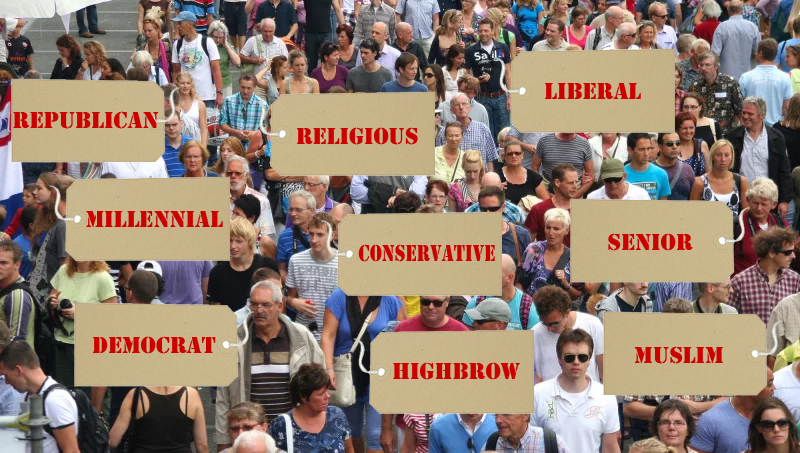Yes, I know. I should not have been surprised. But I was stunned when someone learned one fact about me, and then, relying solely on stereotypes, proceeded to imagine a great many other things about me… most of which were untrue.
It happens with alarming frequency. We label a person. The human tendency is for our imaginations to fill in the blanks… often with that which we fear. We make assumptions about a person’s character, personality and beliefs, based on this label and what it is popularly believed to represent. Those assumptions may or may not be correct… but most people never bother to find out.
Often, the function of a label is establish division. It is a way of individuating oneself: establishing your own identity by highlighting how you are different from others.
Owning your own identity is a good thing. The problem comes when you try to shore up your identity, not just by having pride in yourself, but by denigrating those who differ from you… as if to say, “I’m good, and you’re not.”
This is not a new problem. People complain about it constantly. I hear many people bemoan the divisions in our country. Political differences, religious differences, cultural differences. Yet I hear very few go beyond talking, and actually try to do anything about it. For most people, bridging the gap and healing divisions seems to be about vanquishing the “other side.”
If we ever got honest enough to go out in the streets and uncover our common grief, we would discover that we are all grieving over the same things. –Miguel Unamuno
But here’s a secret. Believe it or not, it is possible to own your identity, to feel strong and confident about who you are and what you believe… without demonizing those who believe something else. Yes, as amazing as it might seem, you can treat someone with courtesy and respect even if you think that their values and beliefs are dead wrong. You can hold on to your own values, without compromising your beliefs, and still be friends with people whose values and beliefs are the opposite of yours.
Bridging that gap is not easy; it requires listening with an open mind. Instead of making assumptions about what someone believes, why not actually ask them? Why not find out what they believe? You might be surprised. You might even discover that you have more in common than you think.
This seems to be a difficult thing to do. The person who labeled me had no interest whatever in my beliefs. Their only interest was to say, in so many words, “You are not like me. I reject you.”
Convictions are more dangerous enemies of truth than lies. –Friedrich Nietzsche
As I’ve pointed out before, scientists have demonstrated that we are genetically more invested in winning arguments than in thinking clearly. Confronting this person would have been useless because they were entrenched, and unable to hear or see any reality other than the one they had created for themselves. So I remained silent. But there are a few things I would have liked to say:
You have NO clue what I believe.
I do not fit into most standard label categories. It’s almost impossible to label me as liberal or conservative, Democrat or Republican, Christian or agnostic, or any kind of class distinction. But somehow, you decided that I fit neatly into some category, and that, as a result, you know everything there is to know about me.
You are totally wrong.
Not only do you have no clue what I believe, you THINK that you DO know. Because of your mistaken certainty, your mind is completely incapable of discerning the actual truth. You have no curiosity at all, no desire to find out what is real. And that lack of curiosity has made you blind.
I know who I am. I know that your assumptions about me are wrong, mere fantasies concocted by your imagination. They don’t affect me. But they sadden me.
I feel sad for you, because you cannot see. I feel sad for our world, because this blindness is widespread and causes rifts that continue to deepen, spreading hostility, fear and pain to everyone.
But I’m not giving up on you. I’m holding out hope that one day you will find the strength to challenge your fears, and crack the closed door of your mind just enough to let in a little light. I’m holding out hope that in the end, love will be stronger than fear.



